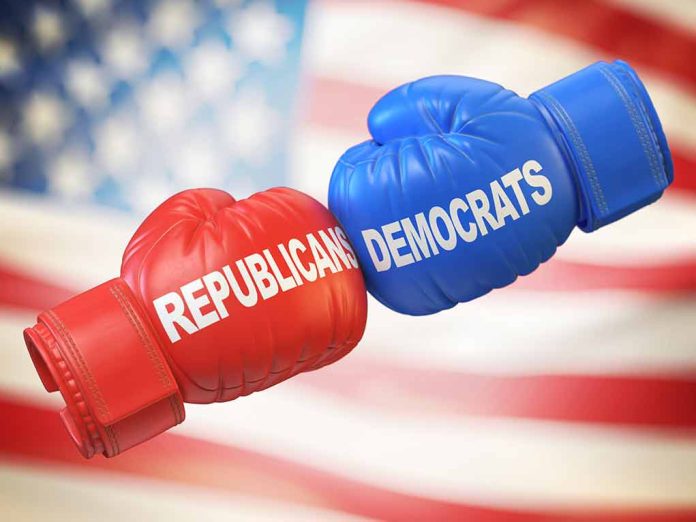
Nine Senate Democrats have withdrawn their support for the GENIUS Act, a bipartisan cryptocurrency bill aimed at regulating stablecoins, citing security concerns amid growing connections between the Trump family and crypto ventures.
Key Takeaways
- Nine Senate Democrats pulled support from the GENIUS Act, citing insufficient provisions for anti-money laundering and national security.
- The bill needs Democrat votes to reach the 60-vote threshold for cloture, with Republicans holding only 53 Senate seats.
- Republican Senator Bill Hagerty criticized the withdrawal as “partisan games” undermining the bill’s momentum.
- The withdrawal coincides with the Trump family’s launch of the “USD1” stablecoin, raising concerns about potential conflicts of interest.
- Stablecoins are digital assets pegged to external value points like the U.S. dollar, intended to provide more stability than traditional cryptocurrencies.
Democrats Retreat from Bipartisan Crypto Bill
In a significant setback for cryptocurrency regulation, nine Senate Democrats announced they would not support the GENIUS Act, legislation aimed at creating a federal regulatory framework for stablecoins. The bill had previously shown promising bipartisan momentum after passing the Senate Banking Committee with an 18 to 6 vote. Senator Bill Hagerty, the bill’s Republican sponsor, had been working to build a coalition that included support from at least five Democrats on the committee, but this recent development threatens to derail the legislation.
The withdrawing Democrats specifically cited concerns about the bill’s provisions related to anti-money laundering measures, regulation of foreign issuers, and national security protections. These concerns emerged just as Senate Majority Leader John Thune was preparing to advance the legislation to a full Senate vote, highlighting the increasingly political nature of cryptocurrency regulation in the current environment.
It’s 2025 and stablecoins are stepping into the spotlight as key players in the evolution of global finance.
The U.S. is finally taking concrete steps to define the future of these digital dollars with two fittingly named acts.
The GENIUS Act and the STABLE Act, two… pic.twitter.com/cxiCltpWW4
— shaaa (@shaaa256) May 2, 2025
Mathematical Challenges for Republican Supporters
The withdrawal creates a significant parliamentary hurdle for the bill’s advancement. For the GENIUS Act to proceed to a vote, it must first achieve cloture, which requires 60 votes to prevent endless debate. With Republicans holding only 53 seats in the Senate, the bill needs support from at least seven Democrats to move forward. Senate Minority Leader Chuck Schumer has further complicated matters by advising Democratic senators to withhold commitment to the bill, creating space for potential amendments.
“We cannot allow partisan games to derail the momentum we’ve seen over the past 3 months on this legislation. We have a choice here: move forward or underscore that digital asset and crypto legislation remains solely a Republican domain,” said Sen. Bill Hagerty (R-Tenn.).
Senator Ruben Gallego (D-Ariz.) addressed the specifics of Democrats’ concerns, noting that the current version of the legislation fails to adequately protect the financial system. The timing suggests Democrats may be seeking additional leverage to strengthen the bill’s regulatory framework before moving forward with support, though political calculations may also be at play.
Trump Family Connections Complicate the Debate
The Democrats’ withdrawal coincides with the Trump family’s increased involvement in cryptocurrency ventures. President Trump’s sons, Donald Trump Jr. and Eric Trump, recently launched a stablecoin called “USD1” through Trump-backed World Liberty Financial. This timing has raised questions about whether the Democrats’ retreat is politically motivated or genuinely focused on regulatory concerns. The stablecoin is linked to a $2 billion investment in the Binance crypto exchange by Abu Dhabi’s MGX, creating additional layers of complexity.
“[T]he bill as it currently stands still has numerous issues that must be addressed, including adding stronger provisions on anti-money laundering, foreign issuers, national security, preserving the safety and soundness of our financial system, and accountability for those who don’t meet the act’s requirements,” Sen. Ruben Gallego (D-Ariz.) said.
Notably, the political division isn’t strictly along party lines. Republican Senator Cynthia Lummis, a Trump supporter, expressed concerns about the President’s family’s involvement in cryptocurrency, stating, “This is my President that we’re talking about, but I am willing to say that this gives me pause.” Meanwhile, Democrat Senator Warren took a stronger stance, describing the situation as “corruption” that no senator should support.
Regulatory Future for Stablecoins
The GENIUS Act aims to create clear guidelines for stablecoins, which are digital assets with values fixed to traditional assets like the U.S. dollar. The legislation would establish licensing requirements, clarify boundaries between state and federal regulation, and set reserve requirements for issuers. Supporters argue these measures would help modernize the U.S. payment system while maintaining dollar dominance in global markets.
“The GENIUS Act establishes a clear, pro-growth, and secure regulatory framework to modernize our payments system and cement U.S. dollar dominance,” said Sen. Bill Hagerty (R-Tenn.).
The initial optimism for regulatory clarity has diminished in the wake of these developments. Industry observers now anticipate further revisions will be necessary before the bill can advance, creating continued uncertainty for crypto markets. This regulatory ambiguity comes at a time when bitcoin prices have already shown volatility, highlighting the importance of clear regulatory frameworks for the broader cryptocurrency ecosystem.
Sources:
- Democrats reverse course to oppose Senate crypto bill – POLITICO
- 9 Senate Democrats Withdraw Support From Bipartisan Cryptocurrency Bill | The Epoch Times
- Genius Act stablecoin Bill to receive Senate vote but Democrat support wanes – Ledger Insights – blockchain for enterprise














